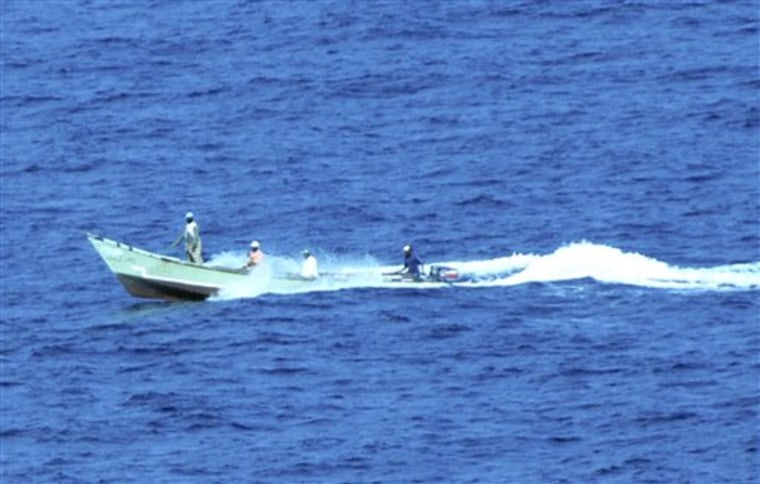Passengers on a luxury cruise liner attacked by pirates in the dangerous waters between Yemen and Somalia said Wednesday they were surprised by the assailants' boldness and described hearing the "Pop! Pop! Pop!" of the pirates' rifles firing at the ship.
Sunday's attack on the nearly 600-foot long M/S Nautica in the Gulf of Aden was the latest evidence that pirates have grown more aggressive, viewing almost any ship on the water as a potential target.
"We didn't think they would be cheeky enough to attack a cruise ship," Wendy Armitage, of Wellington, New Zealand, told The Associated Press shortly after disembarking the ship for a daylong port stop in the Omani capital of Muscat.
"It was very minor really," she said of the attack that lasted about five minutes. "But it was a surprise that they attacked us, and they did fire shots."
Separately, pirates freed a hijacked Yemeni cargo ship and its eight crew members without receiving any ransom, officials said Wednesday. The ship, released Tuesday night, was seized last month in the Arabian Sea.
The European Union also announced that an EU flotilla will begin anti-piracy operations off the coast of Somalia next week.
Not too 'scary'
During Sunday's assault on the cruise liner, pirates fired eight rifle shots at the ship, according to its operator, Oceania Cruises, Inc. But the captain ordered passengers inside and accelerated the cruise liner quickly, leaving the pirates far behind in their 20 to 30-foot speedboats.
"I couldn't see them shooting, but I heard them hitting the ship, 'Pop! Pop! Pop!'" said Clyde Thornberg, on vacation from his home in Bend, Oregon. "It wasn't really scary because the captain announced for the safety of everybody to get inside and get down, and by that time he was pouring on the coals to the ship and was outrunning them."
Sunday's assault was not the first time a cruise liner has been attacked. In 2005, pirates opened fire on the Seabourn Spirit about 100 miles off the Somali coast. The faster cruise ship managed to escape and used a long-range acoustic device — which blasts a painful wave of sound — to distract the pirates.
Several passengers on the Nautica said the ship's crew used a similar device to ward off Sunday's attack, and at least two passengers described hearing two "boom" sounds after the pirates fired their rifles.
The passengers had been briefed before the cruise got under way about potential dangers and on the acoustic device's importance to the vessel's defense.
"We had been reassured that they had these ghetto blasters that would go through them," said Lynne Pincini, of Australia. "Also, they said we could outrun anything, and we were in this corridor."
International warships patrol the area and have created a security corridor in the region under a U.S.-led initiative, but attacks on shipping have not abated.
In about 100 attacks on ships off the Somali coast this year, 40 vessels have been hijacked. Thirteen ships remain in the hands of pirates along with more than 250 crew members including a Saudi supertanker filled with $100 million worth of crude and a Ukrainian ship loaded with 33 battle tanks.
'No ransom'
Pirates released the Yemeni cargo ship Tuesday after an appeal by local clan elders and regional officials. Somali state minister Ali Abdi Aware said "no ransom was paid."
"During discussion the pirates were successfully convinced to release the ship because it always brought commercial goods to the region," said Abdi-nur Faratol, one of the negotiators.
A Yemeni security official had said the pirates were initially demanding a $2 million ransom to release the ship and its crew of three Yemenis, three Somalis and two Panamanians.
EU foreign policy chief Javier Solana said six EU and three maritime reconnaissance aircraft will replace a NATO naval force that has been patrolling the region and escorting cargo ships carrying relief aid to Somalia since the end of October.
Though NATO ships have successfully delivered humanitarian supplies to Somalia, they have not been able to stem the upsurge in pirate attacks on foreign shipping in one of the most important shipping lanes in the world.
Solana said the EU warships will arrive Monday, and the hand-over with the NATO force will take place Dec. 15.
"These tasks will be done with very robust rules of engagement," Solana told reporters on the sidelines of a meeting of NATO foreign ministers in Belgium.
On Tuesday, the U.N. Security Council extended for another year its authorization for countries to enter Somalia's territorial waters, with advance notice, and use "all necessary means" to stop piracy and armed robbery at sea.
Somalia has not had a functioning government since 1991, and pirates have taken advantage of the country's lawlessness to launch attacks on foreign shipping from the Somali coast.
More on Oman | European Union
